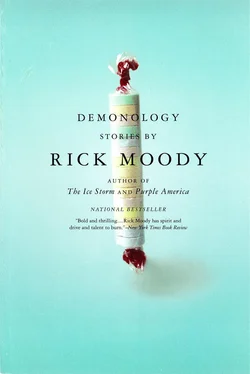It was no particular honor that he’d gotten invited to Foster’s Halloween party. It was not evidence of diversity in the matter of invitations. Foster invited every student in their class. All the sophomores and juniors at the day school. And he invited the kids on his street, Brookside. Most of the kids from the school didn’t want to come to Darien to go to a Halloween party. A lot of them were from the next town over. They had mischief in their own neighborhoods. They soaped windows on the hospital in their own town.
Gerry Abramowitz’s mother had theories about Halloween. Her maiden name was Callahan. She was a psychologist. She argued that, according to recent monographs on the subject, Halloween was a counterproductive American holiday tradition, inherited from Druids and other pre-civilized groups, one which encouraged liberty hysteria among children of the upper-middle class (the term, of course, derived from the Diagnostic and Statistical Manual, third edition), itself a dangerous condition of lawlessness upsetting to children even as they coveted it. Liberty and security are at opposing ends of an essential continuum, and security is important enough in the ego formation of children that liberty should be tightly controlled in order to create and nourish feelings of safety. The real ghouls depicted in Halloween outfits, in masks, his mother argued, were the ghouls of lawlessness residing in young people. When faced with drugs, explosives, incendiary devices, pint flasks, premarital sex, well, children of the suburbs began to panic, to beg for regulations, for maximum-time allotments for television-watching, for curfews, and so forth. His mother went further. The most popular costume of the Connecticut region was the vagrant. The bum, as the young called this sinister figure. And who was this archetype? He was the children despairing of themselves, of course, of their place in affluent civilization. He was their feelings of homelessness and dispossession writ large. The windows that got soaped, the shaving cream in the mailboxes, toilet paper in all the trees, liberty hysteria, an upsurge of the stratum of destructive fantasy that must be suppressed in a democratic society if it wished to function securely, equitably, peaceably. Gerry’s mother therefore concluded that the Fosters’ party was an affront to commu nity standards. Gerry had no business being there at all, but his father had the final say.
Party, blessed word, blessed state, thank God for parties, for ounces of dope, harder drugs. That hippie shit, that vestigial tune in, turn on, drop out business that mainly expressed itself in sleeping overnight in front of record stores until concert tickets went on sale — this was horse shit. And yet partying was a holiness. It survived even a squabbling over music. A little squabbling at a party was a good thing. A fistfight over a billiards table, drinks flung at a girl, someone’s car stolen, beds of parents befouled with teenage bodily fluids. Get the intoxicants together! Night had descended! So his parents loaned Gerry their Jeep, because other parents were doing it too, and he was driving it over to Foster’s place, though he could have walked; this was his mothers negotiated compromise: Idon’t want you walking miles in the dark and the cold on a night like this. His father intervened, at last, Let the kid do what he wants. I could swear you were a kid once, too. Looking up from the day’s most active trading. Gerry exploited this gap in consensus, procured the car keys, drove.
There was one kid he would know well at the party, Julian Peltz. Peltz was of the persecuted faith, too, Gerry was sure. He was of the wanderers on the globe. But Peltz would never answer any questions about it. A cloud passed over Peltz’s face when Gerry asked, Is your family German or Polish, or what? Peltz was not noteworthy in any way. He wasn’t good in school, wasn’t good at sports, wasn’t extracurricular, didn’t play chess, had only one record: a scratchy copy of Classical Music for Young People, conducted by Leonard Bernstein. He was a guy in school whom people liked all right but with whom they would stop to talk only if unobserved. However, a subject on which Peltz was really well informed was human sexuality, and that was why Gerry liked him. Since his own mother was a mental health professional and every discussion on any subject was laden with doctoral revelation, Gerry couldn’t stand talking to her about sex, Honey, I know that you’re expressing your need to individuate, but it’s important that you understand my authority and allow me access to your bed and your underthings when I am in the process of cleaning your room. And furthermore, Gerry, I need to know about how much information you’ve gathered in your social network on the issues of the erotic drives. Can we have an honest dialogue about this?
His social network consisted mainly of Julian Peltz. At lunch, at school, Peltz constructed quizzes. You know what frottage is, right? It’s really cool Like you’re on a bus, okay. You’re on a bus and it’s really crowded, crowded with girls, let’s say. And there’s no room left to sit. You’re going to the big game and you’re on this bus, with all these girls, and you know you could just sort of brush up against one of those girls, while she’s standing there, you brush up against her using the lower part of your torso as the targeting mechanism, right? And then everybody clears out of that end of the bus and bingo, you get a seat. It’s really easy! Gerry antiphonally replied: You are totally fucked up. Nevertheless, he had an alibi when his mother entrapped him and demanded if he knew what protection was, or how a girls menstrual cycle fluctuated, or the precise location of the clitoris. Peltz had explained all this to him, over the years, had given him a package of rubbers. There’d also been the instruction of Mr. Smith, school psychologist, of whom everyone said he touched students inappropriately. (Peltz: I’d just about pay someone to touch me inappropriately. How come I always get overlooked when the inappropriate touching is going around?) Mr. Smith recently slipped a rubber on a banana for the tenth grade kids. Gerry knew about protection. Gerry had ideas about love. Gerry was therefore able to rebuff his mother’s theoretical overtures. Meanwhile, Peltz: Today I’m going to tell you about a particular taste of some guys, which is how they like to go down between their wives’ legs during the time of the month, when … Or one day it was necrophilia, and how Peltz said that necrophilia was a perfectly reasonable lifestyle choice, especially since it only required the consensual input of one adult, so what difference did it make? Victimless crime!
Often Gerry would show up at school, late, and kids would be loitering out front, getting ready to go to their first classes, and he’d see Peltz a hundred yards off, talking to a tree or to a dog or to a chipmunk, probably on subjects such as double-digit inflation or Jimmy Carter’s adultery of the mind. No one noticed Peltz’s loneliness. If Peltz neglected to show up for school, it would have been weeks before anyone would have inquired. He was a library assistant, it was true, and probably, eventually, people would have had trouble checking out their library books, but, at the same time, he was of such diminutive stature that he was almost invisible behind the counter in the library, and Gerry wasn’t sure anyone really knew Peltz was there. They probably believed the checking-out procedure was automated. The line would back up, if he vanished, and people would demand copies of INever Promised You a Rose Garden and A Separate Peace, and there would be library complaints, because Peltz was dead.
Читать дальше












